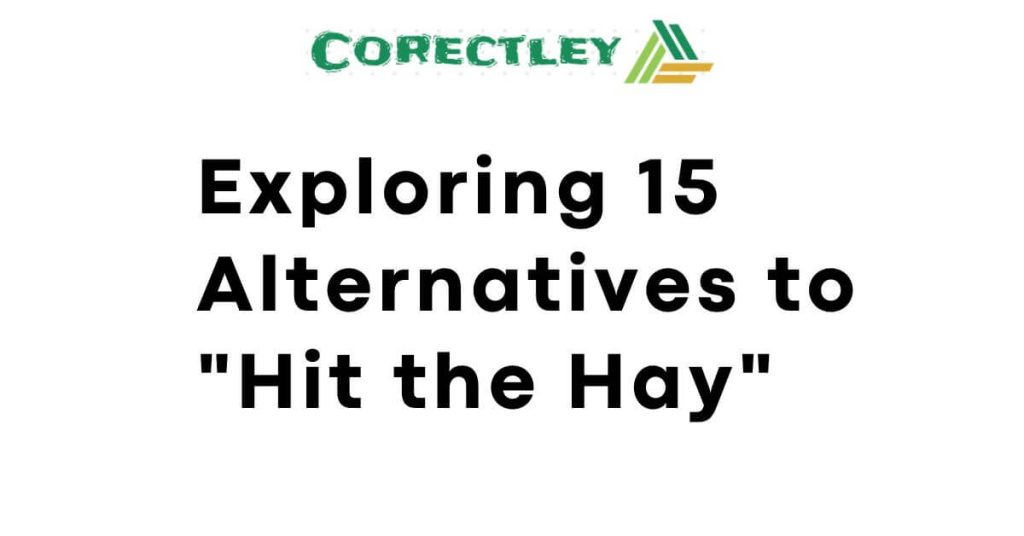That’s what I grasp if it is your most memorable time hearing this expression, you should give it a scholarly translation, kindly don’t. Colloquialisms are irregular proclamations generally with demonstrative significance to an unconventional gathering.
As an English speaker, you can rest assured that this page will explain the meaning of “hit the hay” and fifteen other expressions that are similar to it. Headways!

“Hit the hay” meaning
The expression “hitting the hay” is an informal articulation that implies hitting the sack or nodding off. It is an easygoing and conversational approach to alluding to the demonstration of resting on a bed or sleeping cushion, normally by the day’s end when one is drained and prepared to rest.
What does the beginning of this expression seem to be? Harking back to the 1880s when this expression was first usually utilized, it didn’t depict persons nodding off overall. It started from hitting or striking the feed or straw tracked down in dated beds or sleeping pads to cushion them up before resting. Over the long haul, it has turned into a typical and cheerful method for looking at nodding off.
Like a couple of different words, nonetheless, this expression began to change its significance in the mid-1900s – where it means stay in bed in general terms.
There is no exceptional method for involving this expression in regular discourse, as long as you agree with the English essential punctuation rules.
15 Similar Phrases to “Hit the Hay”
1. Hit the sack
Hitting the hay and hitting the sack have a comparable beginning. Both, as you ought to have known, allude to nodding off.
Momentarily, this is the very thing you want to be aware of this colloquialism. Once upon a time, before the sort of bed sheets/cloth we use today, material (bed blankets) was frequently made with sacks.
Thus, hit the sack and hit the hay are phrases that work inseparably; People are said to sleep in hay, but sometimes they get sacks to cover their beds.
A few specialists have detailed that roughage was full in sacks back then, presently meaning bed and its sheet.
2. Sack out
To hit the hay is to fall asleep. The significance of this expression stays unaltered paying little mind to where one dozes.
Recollect that attributable to the beginning of the at first considered express, one will as it were confine it to rest on the bed.
3. Turn in
Of all that will be viewed on this page, turn-in is a more liberal and general assertion. With the end goal of our concentration here, it means to fall asleep.
It has a few different implications other than this, yet let us be less worried about that.
Due to its ambiguity, the term “turn in,” which is another idiom for “going to sleep,” is not one you want to use often.
To decrease the equivocalness in this expression, you can constantly join it ‘to rest/bed’. So you say ‘I will before long go in to rest’. Turn-in may not be an expression regularly utilized in this sense, however its most memorable use dates as far back as the last part of the 1690s.
4. Kip Down
Having its starting point directly from England, this expression has various firmly related understandings. Before going to think about the expression in general, we should see the watchword in it; Kip. To kip is to drift off.
Native speakers would typically say, “I will be home to Kip for a few hours.” In the U.K., moreover, Kip may likewise replace such words as rest.
Thusly, the approaching together of Kip and Down summarize to: ‘ falling asleep’, ‘planning to rest,’ ‘hitting the sack,’ ‘dozing outside one’s home’, and so on – acts that ultimately end as rest. Make camp is one exceptionally close equivalent word to this English shoptalk.
5. Go to sleep
You may not effectively notice that this could likewise fill in for raising a ruckus around town on the off chance that it doesn’t come to this rundown. It is what different expressions mean.
Truly, this might remain as a sentence, on the off chance that it is considered a basic explanation, where subjects are not fundamental.
Many people would find it unnatural to hear you say, “You go to sleep,” so “go to sleep” conveys the same idea.
Consequently, we will only use it as an idiom rather than a phrase.
You are not new to hearing ‘nod off’, it is an assertion you don’t exceptionally figure out how to utilize. You can continuously make it supplant ‘hit the sack’.
6. Crawl In
One thing you’d see assuming you carve out an opportunity to notice colloquialisms is that they are frequently reminiscent of their implications. We previously thought to be the expression ‘turn in’, and this isn’t the same as it.
In the wake of a monotonous day working in your office, you don’t wake up to see that you are sleeping. You stroll into it. The modified “crawl in” is the act of walking in.
At the point when one plans to rest and lie in bed, we say they slither in. Then again, ascending from bed is creeping out, similarly to ‘turning in’.
7. Out like a light
This is very nonequivalent to different expressions prior inspected thus, however, it has an implication that verges on nodding off.
To go out cold is to nod off out of nowhere. People rarely suddenly vanish from their immediate environment, but it’s common knowledge that some people fall asleep almost immediately.
Because it is unique to some people, this is typically a way of life. Stress and other similar factors could also be the cause.
“In no time, he had gone out cold,” could similarly be said as “… he had stirred things up around town.” The two expressions can be filled in as one in specific settings.
8. Put to bed
This is particularly the best decision of words for you while alluding to a kid. Not all kids hit the sack without anyone else, so with your help, you have taken care of somebody.
You don’t have bogus information assuming you initially realize that this will generally be one phrase for ‘kid conveyance.’ You only want to know that it doesn’t end there at this point.
You can accept this as its figurative ramifications, and ‘making it lights-out time for in bed’ as a scholarly understanding of the expression.
To stay away from disarray, some join these words to suggest their scholarly significance and leave it isolated for a demonstrative one. Coincidentally, I think it is really smart to purchase.
9. Sleep tight
Okay, so these might be the farewell words you get from your sweetheart/sweetheart consistently as you nod off, however, it needs to come to this rundown.
Maybe, you never tried to explore what this assertion implies — I have you here.
Simply put, sound sleep is restful sleep. Some might contend it can’t replace raising a ruckus around town, however, it is even a kinder method for saying ‘hit the sack’. Your sweetheart would rather not hear you say ‘rest!’ He or she would like to hear, “Sleep well!”
This expression’s starting point can be followed back to the middle age time frame when ropes (rather than springs) were to be firmly tied under the bed for better rest.
10. Time to retire

I know the main thing a non-local speaker of English is bound to consider after hearing this. However, this has nothing to do with your career anyway. Just you and perhaps your bedding.
This phrase may mean different things to different people, but because of the context, it will always mean what you want them to know. Not even the natural client of English will misconstrue you when you utilize this expression accurately.
In its rough structure, this could suggest ‘resting,’ ‘nodding off/bed’, as well as ‘getting back.’
11. Fall asleep
This also subs for ‘hit the sack,’ yet it seems, by all accounts, to be more vague. In opposition to the significant expression in thought, this doesn’t imply you on where one dozes.
You are simply informed that they slept, but you are unable to determine whether dizzy spells cause them to be half-asleep while standing. This is your go-to phrase whenever you want to keep things a little vague.
In “I didn’t raise a ruckus around town before nodding off the previous evening,” perusers will comprehend that the essayist rested (perhaps a little), yet didn’t creep into bed.
In another sentence like, “Gracious, he has nodded off, I didn’t have the foggiest idea when he hit the sack,” the two expressions convey a similar significance.
12. Lie down
Consider this a bonus: it is ungrammatical to say you set down, we express ‘rests.’ By the way, it’s a question that gets asked a lot. By rests, one is alluding to rest (particularly a short one).
Even if they don’t intend to, people can fall asleep minutes after lying down comfortably without coming into contact with hay.
What’s more, granted, feed is required for an extended rest, so this is the rationale behind resting as an expression for short rest/rest. This expression is more particular to English.
13. Tuck in
Tuck in has another importance, however, it is likewise a decent equivalent word for ‘put to sleep’. In any case, these are the two expressions I have saved for nursing moms or other people who put persons, particularly youngsters, to stay in bed.
At the point when you wrap up, you put somebody to bed, by causing them to feel good in bed, pulling bed blankets around them.
14. Catch forty winks
Not so much as a local speaker is protected from the stunt you can perform with phrases like this. To sound more normal and rehearsed, there is around a 50% opportunity you’d send the collector to peruse the web for an understanding when you say this; it’s anything but a usually utilized expression.
“Guess what? Before we meet, I’ll have to get forty more snores.” Additionally, your message recipient is perplexed. He’ll be like: ” What are these winks about, dude? Confused!
He could understand what it implies, however, yet essentially you’re not seeming like the other 200 persons he has addressed over the most recent couple of months.
15. Sleep time
What’s more, here comes the elective that needs no mission. There’s no time like the present when I hit the sack, and that implies it is nearly rest time. This is a lot of a two-word to make sense of a few different expressions on our rundown.
It is that one assertion you shouldn’t forget when you can’t recollect ‘hit the sack’ or potentially all others. It is additionally fine and dandy as ‘time to sleep’.